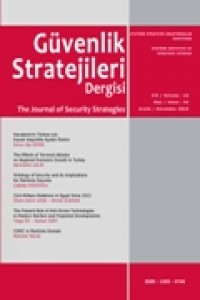Abstract
Askeri bir fonksiyon olarak Sivil-Asker İş Birliği (SAİ), günümüzdeki anlamıyla, 1990’larda Balkanlarda icra edilen barış harekâtları esnasında bir ihtiyaç olarak ortaya çıkmıştır. Anılan dönemde, SAİ’ne, harekât alanındaki sivil aktörler ile irtibat tesis etmek, bu irtibat vasıtasıyla özellikle insani yardım faaliyetleri ile askeri harekâtın eşgüdümünü sağlamak ve mümkün olan durumlarda ve belirli alanlarda sivillerle iş birliği ortamının oluşturulmasını sağlamak için başvurulmuştur. Değişen harekât ortamına uygun şekilde, SAİ’nin katkı sağladığı alanlar da günümüzde çeşitlenerek artmıştır. Konuların çeşitlenmesiyle birlikte yapılan değerlendirmelerde, SAİ’nin sadece harekât esnasında değil harekâtların öncesinde planlama aşamasında da önemli katkısının olacağı anlaşılmıştır. Buna karşın SAİ, kara harekâtlarında uygulanagelmiştir. İhtiva ettiği aktör ve konu çeşitliliği bakımından, deniz alanının oldukça kapsamlı bir ortam sunması SAİ açısından göz ardı edilmiştir. Bu makalede, deniz alanının sağladığı kapsamlı ortamda SAİ’nin deniz güvenliği çabalarına nasıl katkı sunabileceği açıklanmıştır.
References
- NATO, New Strategic Concept, 2010.
- NATO, Allied Joint Publication (AJP) 3.19 Civil-Military Cooperation, 2018.
- WENTZ, Larry, Lessons from Bosnia: The IFOR Experience, Washington, National Defense University Press, 1998.
- AARONSON, M., Y.K. Diessen, M.B. Long and M. Miklaucic, “NATO countering the hybrid threat”, Prism, 2011, Vol.2, No.4, 111-124.
- BACHMANN, S.D., “Hybrid Threats, Cyber Warfare and NATO’s Comprehensive Approach for Countering 21st Century Threats-Maping the new frontier of global risk and security management”, Amicus Curiae, 2011, Issue 88, 24-27.
- BUEGER, Christian, “What is Maritime Security?”, Marine Policy, 2015, 53, 159-164.
- BUEGER, Christian and Edmunds, Timothy; “Beyond Seablindness: A new agenda for maritime security studies”, International Affairs, 2017, 93:6, 1293-1311.
- CUSUMANO, Eugeion and James Pattison; “The non-governmental provision of search and rescue in the Mediterranean and the abdication of state responsibility”, Cambridge Review of International Affairs, 2018, Vol. 31, No. 1, 53–75.
- CUTTİTTA, Paolo; “Repoliticization through search and rescue? Humanitarian NGOs and migration management in the Central Mediterranean”, Geopolitics, 2018, Vol. 23, No. 3, 632–660.
- FELDT, Lutz, Peter Roell and Ralph D. Thiele; “Maritime Security – Perspectives for a Comprehensive Approach”, ISPSW Strategy Series: Focus on Defense and International Security, April 2013, Issue No.222, 1-25.
- FELDT, Lutz, “The importance of the global maritime domain for world politics and security”, ISPSW Strategy Series, October 2015, Issue No.382, 1-10.
- FELDT, Lutz, “Maritime hybrid risks and threats: Consequences for harbours, navies and maritime services – A European View”, ISPSW Strategy Series: Focus on Defense and International Security, January 2019, Issue No.596, 1-10.
- NATO, “Updated list of tasks for the implementation of comprehensive approach action plan and the Lisbon Summit Decisions on the Comprehensive Approach”, dated to 4 March 2011.
- KREMİDAS-COURTNEY, Chris; “Countering hybrid threats in the maritime environment”, Center for International Maritime Security (CIMSEC), http://cimsec.org/ countering-hybrid-threats-in-the-maritime-environment/36553, Access Date: 20 May 2019.
- NATO, Riga Summit Declaration, https://www.nato.int/cps/en/natohq/ official_texts_37920.htm?mode=pressrelease, Access Date: 19 June 2019.
- STAVRİDİS, James, “Maritime hybrid warfare is coming”, Proceedings, https://www.usni.org/magazines/proceedings/2016/december/maritime-hybrid-warfare-coming#comments, Access Date: 30 May 2019.
Abstract
In its current sense, one of the military functions, which is named as Civil-Military Cooperation (CIMIC), has emerged as a result of operational requirements during the peace operations in the Balkans in the 1990s. In this period, CIMIC was needed to establish liaisons with civilian actors, especially to coordinate humanitarian affairs with military operations and to facilitate cooperation if possible. Current changes in the execution of military operations have obliged changes in CIMIC support as well. These changes brought the assumption that CIMIC is not only applicable during an operation but also prior to the operation during the planning process. However, CIMIC has largely been applied for land-focused operations. The maritime domain, which includes a wide variety of actors and topics, has been ignored by the CIMIC perspective. This article explains how CIMIC can contribute in the maritime domain for maritime security efforts.
References
- NATO, New Strategic Concept, 2010.
- NATO, Allied Joint Publication (AJP) 3.19 Civil-Military Cooperation, 2018.
- WENTZ, Larry, Lessons from Bosnia: The IFOR Experience, Washington, National Defense University Press, 1998.
- AARONSON, M., Y.K. Diessen, M.B. Long and M. Miklaucic, “NATO countering the hybrid threat”, Prism, 2011, Vol.2, No.4, 111-124.
- BACHMANN, S.D., “Hybrid Threats, Cyber Warfare and NATO’s Comprehensive Approach for Countering 21st Century Threats-Maping the new frontier of global risk and security management”, Amicus Curiae, 2011, Issue 88, 24-27.
- BUEGER, Christian, “What is Maritime Security?”, Marine Policy, 2015, 53, 159-164.
- BUEGER, Christian and Edmunds, Timothy; “Beyond Seablindness: A new agenda for maritime security studies”, International Affairs, 2017, 93:6, 1293-1311.
- CUSUMANO, Eugeion and James Pattison; “The non-governmental provision of search and rescue in the Mediterranean and the abdication of state responsibility”, Cambridge Review of International Affairs, 2018, Vol. 31, No. 1, 53–75.
- CUTTİTTA, Paolo; “Repoliticization through search and rescue? Humanitarian NGOs and migration management in the Central Mediterranean”, Geopolitics, 2018, Vol. 23, No. 3, 632–660.
- FELDT, Lutz, Peter Roell and Ralph D. Thiele; “Maritime Security – Perspectives for a Comprehensive Approach”, ISPSW Strategy Series: Focus on Defense and International Security, April 2013, Issue No.222, 1-25.
- FELDT, Lutz, “The importance of the global maritime domain for world politics and security”, ISPSW Strategy Series, October 2015, Issue No.382, 1-10.
- FELDT, Lutz, “Maritime hybrid risks and threats: Consequences for harbours, navies and maritime services – A European View”, ISPSW Strategy Series: Focus on Defense and International Security, January 2019, Issue No.596, 1-10.
- NATO, “Updated list of tasks for the implementation of comprehensive approach action plan and the Lisbon Summit Decisions on the Comprehensive Approach”, dated to 4 March 2011.
- KREMİDAS-COURTNEY, Chris; “Countering hybrid threats in the maritime environment”, Center for International Maritime Security (CIMSEC), http://cimsec.org/ countering-hybrid-threats-in-the-maritime-environment/36553, Access Date: 20 May 2019.
- NATO, Riga Summit Declaration, https://www.nato.int/cps/en/natohq/ official_texts_37920.htm?mode=pressrelease, Access Date: 19 June 2019.
- STAVRİDİS, James, “Maritime hybrid warfare is coming”, Proceedings, https://www.usni.org/magazines/proceedings/2016/december/maritime-hybrid-warfare-coming#comments, Access Date: 30 May 2019.
Details
| Primary Language | English |
|---|---|
| Journal Section | Articles |
| Authors | |
| Publication Date | December 31, 2019 |
| Submission Date | May 27, 2019 |
| Published in Issue | Year 2019 Volume: 15 Issue: 32 |


